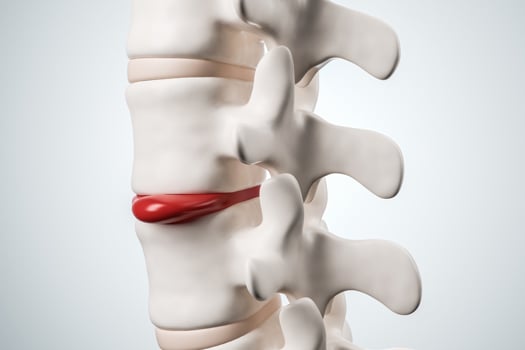
A microdiscectomy is an approach to correcting disc-related issues that ranks with spinal fusion surgery as one of the most common spine procedures performed today. It's a minimally invasive way of removing the part of a disc in the lower back area that's irritating a nearby nerve, and it’s done with smaller incisions and specialized instruments. Today, we're taking a look at how likely it is you'll experience reherniation after a microdiscectomy and what can be done to reduce this risk.
Microdiscectomy Reherniation Rates
The National Institutes of Health conducted a study to determine the rate of reherniation after patients have microdiscectomies. The study looked at nearly 200 patients who had this procedure due to issues with herniated discs in the lumbar spine area. According to results from the study, the recurrence rate was around 9 percent, while the reoperation rate was 6 percent. Other sources suggest reherniation occurs about 10 to 25 percent of the time for patients who’ve had surgery for herniated discs.
Why Microdiscectomy Reherniation Rates Vary
Data on overall reherniation rates may vary because there are many types of disc herniations. For example, a study published at Stanford found that patients with a large hole left in their disc after surgery had up to a 27 percent risk of reherniation and a 21 percent risk of needing another operation. Data suggests women under 50 years old may be at an even higher risk, up to 10 times the average. Microdiscectomy surgery is done in a less disruptive way that maintains the overall integrity of the spine and its discs, compared to more invasive spinal procedures. However, there’s one aspect of microdiscectomies that could contribute to reherniation: only part of the affected disc is typically removed. The risk here is that not enough disc material may be removed or what's left may eventually irritate an adjacent nerve.
Reducing Reherniation Risk after a Microdiscectomy
Several factors can affect the risk of reherniation following a discectomy or any type of spinal disc procedure. These include the overall condition of your spine and its discs and the specific location of the surgery. You may be able to reduce your risk of reherniation, which refers to a return of disc-related symptoms at any point beyond the initial healing and microdiscectomy recovery period, by making an effort to:
• Follow surgeon instructions and guidelines after your surgery
• Stick to your post-surgery physical therapy and exercise routines
• Report any unusual symptoms or discomfort you may experience
• Make appropriate lifestyle changes (e.g., watching your weight and diet, not smoking, and getting regular exercise)
Reherniation Doesn’t Always Equal Another Surgery
As mentioned above, the reoperation rate following microdiscectomies is lower than the reherniation rate. The reason is because having a return of disc-related symptoms doesn’t necessarily mean additional surgery will be recommended. In fact, it’s not unusual for patients to get sufficient benefit from appropriate conservative treatments to manage or noticeably minimize reherniation symptoms.
Although microdiscectomy surgery is generally a very successful procedure, patients with a larger hole in the outer ring of the disc have a significantly higher risk of reherniation following surgery. Often, the surgeon won’t know the size of the hole until he or she begins surgery. A new treatment, Barricaid, which is a bone-anchored device proven to reduce reherniations, was specifically designed to close the large hole often left in the spinal disc after discectomy. This treatment is done immediately following the discectomy—during the same operation—and doesn’t require any additional incisions or time in the hospital. In a large-scale study, 95 percent of Barricaid patients didn’t undergo a reoperation due to reherniation in the 2-year study timeframe.
If you have any questions about the Barricaid treatment or how to get access to Barricaid, ask your doctor or contact us at 844-288-7474.
For full benefit/risk information, please visit: https://www.barricaid.com/instructions.


Comments